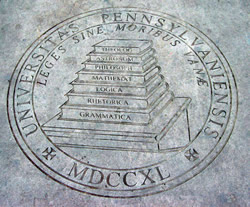October 21, 2003
The plastic fetters of grammar
Several times a day, when I walk over the patch of sidewalk inscribed with the picture below, I'm reminded of how far linguistic analysis has faded out of public consciousness.
 In the world of Shakespeare and Descartes, or Jefferson and Franklin, the foundation
of a liberal education was the "trivium" of grammar, rhetoric and
logic. Today, only a small fraction of American college students have ever been
taught anything about any of these subjects: the trivium has become non-trivial.
In the world of Shakespeare and Descartes, or Jefferson and Franklin, the foundation
of a liberal education was the "trivium" of grammar, rhetoric and
logic. Today, only a small fraction of American college students have ever been
taught anything about any of these subjects: the trivium has become non-trivial.
Disciplinary special pleading aside, the result is to blunt and coarsen public discourse on language in all its aspects, from style and usage to reading instruction and bilingualism. Americans haven't stopped talking about language, but few of us, on any side of any issue, know what we're talking about.
It's consoling to reflect that as analytic understanding of language has decreased, so have the negative emotions associated with educational force feeding.
If you're lucky enough to belong to an institution with a subscription to the literature online service, try searching English poetry for the word "grammar". Over many centuries, you'll find phases like "grammar's servile fetters," and be told how an "insect dry discoursing gammer / tells what's not rhyme and what's not grammar." This passage from Beaumont's Psyche is typical in tone:
This forc'd through many tedious sweating Years
The patience of the earnest Student; who
Consumed with a thousand pallid Cares,
Amidst his painful Work could nothing do.
For to inrich his Tongue, his Brains he brake,
And aged grew e'r he had learn'd to speak.Strange scrambling Alphabets this multiply'd,
And to an Art improv'd Necessity;
Each parted Tongue this did again divide
Into Eight several Stations, and by
Unworthy Grammar's busy Niceties
All generous Apprehensions exercise.Yea Grammar too found all her Laws too weak
To govern Language's extravagance;
Such odd and unruly Idioms did kick
Against her setled Discipline, and prance
So wildly through Expression's fields, that Art
Was fain to play the child, and conne by heart.
In contrast, recent English-language poetry generally discusses linguistic analysis in neutral or even positive terms:
| The plastic character of grammar | |
| seems to deride | |
| the lexical excesses | |
| of botany. |
(Miles Champion, Transcendental Express, 1996)
I don't know what "the plastic character of grammar" is, but I think it's a step up from "servile fetters."
If linguistic analysis is now generally ignored, at least it's no longer generally hated. In this respect, its role has been taken over by mathematics :-).
Posted by Mark Liberman at October 21, 2003 05:48 PM